
From Baby Boomers to Gen Z… are you using the right marketing strategy for your audience?
As marketers, we have to find ways to group our target market. Trying to gain the attention of our targets, it helps immensely if we understand how they tick and what motivates them to make a purchase decision. Generational marketing strategies offer a simple solution to a complex challenge.
Here is how to craft effective messages that convert.Generational targeting uses generational segmentation and although generalising at a grand scheme, it is said to be more effective than most other forms of segmentation. When we are talking about generational marketing, we are referring to the four main generations: Boomers, Generation X, Millennials and Generations Z. A quick look in the dictionary will tell you that a generation is the collective of people born and living at about the same time. It is therefore assumed that they share similar life experiences and are shaped by that particular time period. Having this information allows us to craft messages that effectively connect individuals with brands that share their values and ideas.
If this is the first time you’re hearing about generational targeting or segmentation in marketing, you’re about to learn why “one message for all”, simply won’t compute. Our team of online marketing experts has done an extensive amount of research on the topic over the past years and is now sharing their knowledge with you. Here is what they’ve learned!
Generation Baby Boomer
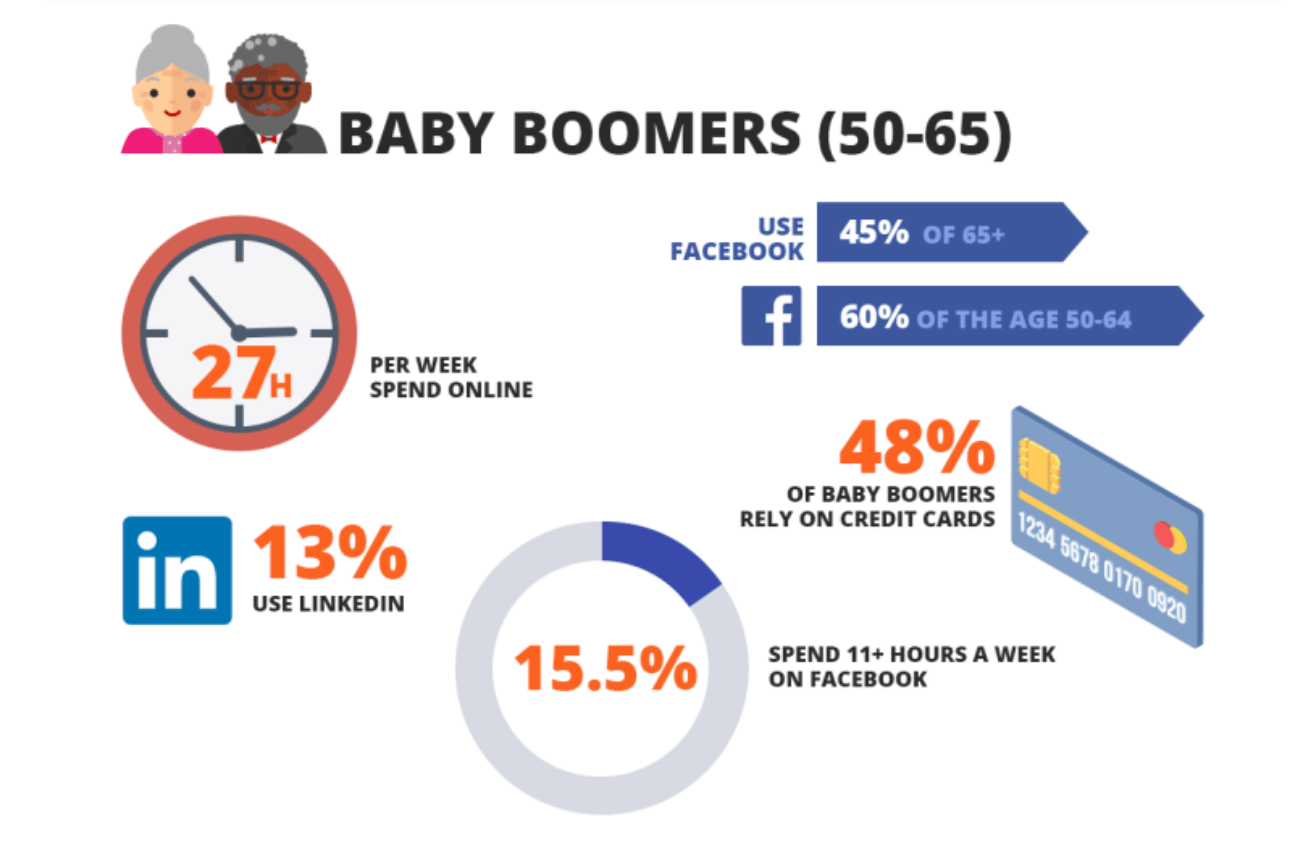
Source: SmallBizTrends
Born between around 1946 to 1964, Boomers are now between 55 and 73 years old and make up about 20 percent of the population. Their numbers and relative prosperity make Baby Boomers an affluent generation. They are often defined as optimists with deep pockets who celebrate consumerism and enjoy having more money than previous generations to spend on food, clothes, and holidays. Many of them find it hard to take a step back and plan on staying part of the workforce even after reaching retirement age, in order to maintain a sense of purpose.“Unlike their parents who grew up during the Great Depression, Boomers became great consumers. They became famous for spending every dollar they earned.” - Michael T. Robinson, 2020.
Contrary to popular belief, older people actually do know how to navigate the internet. The percentage of individuals aged 65 and above that use social media is about 34 percent. Thanks to younger generations, grandparents have found their ways onto social platforms such as Facebook, many of them using social media to revive old relationships and stay up to date on the life of family members and friends. Identifying and understanding the generational values of each age group will help you align your marketing strategy and brand message to your target audience.
Generational values of Baby Boomers:
- Individualism
- Community involvement
- Prosperity
- Ownership
- Self-actualisation
- Health
- Wellness
Here are a few great examples of generational marketing targeting Baby Boomers.
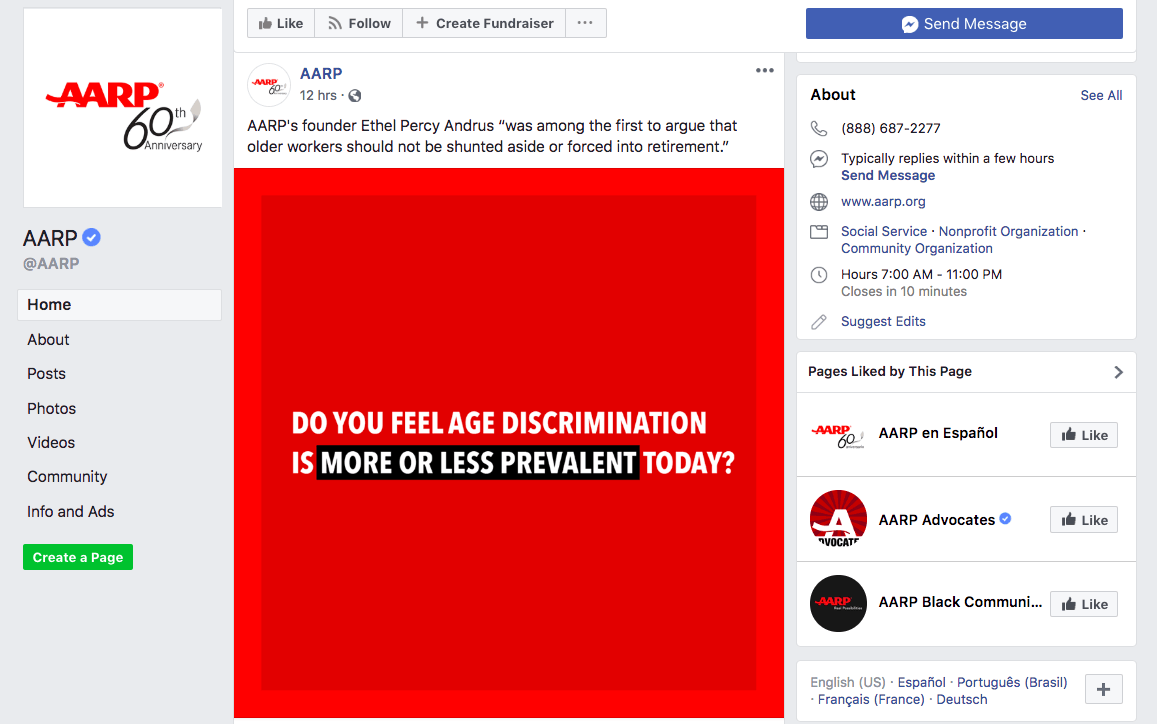
Source: AARP Facebook Page
The AARP (American Association of Retired Persons) understands what exactly Boomers want and posts on their favourite social media platform Facebook several times a day, highlighting issues that they care about.

Source: Virgin Atlantic
We all love a good value, and Boomers are no different. Virgin Atlantic created a comprehensive but easy to understand loyalty program offering benefits at the early stages of each membership.You may notice a few things these advertising materials have in common: They’re single images that allow for absorption of content and create space, combined with large fonts.
Older people need less clutter visually. Distractions, many images, lots of small text do not appeal. We also recommend the use of positive content when marketing your company’s products and services. “Compared with young adults, older people remember more positive than negative content, or show reduced memory for negative information.” - Elvira García-Bajos, Malen Migueles, and Alaitz Aizpurua, Sep 2017.
Generation X
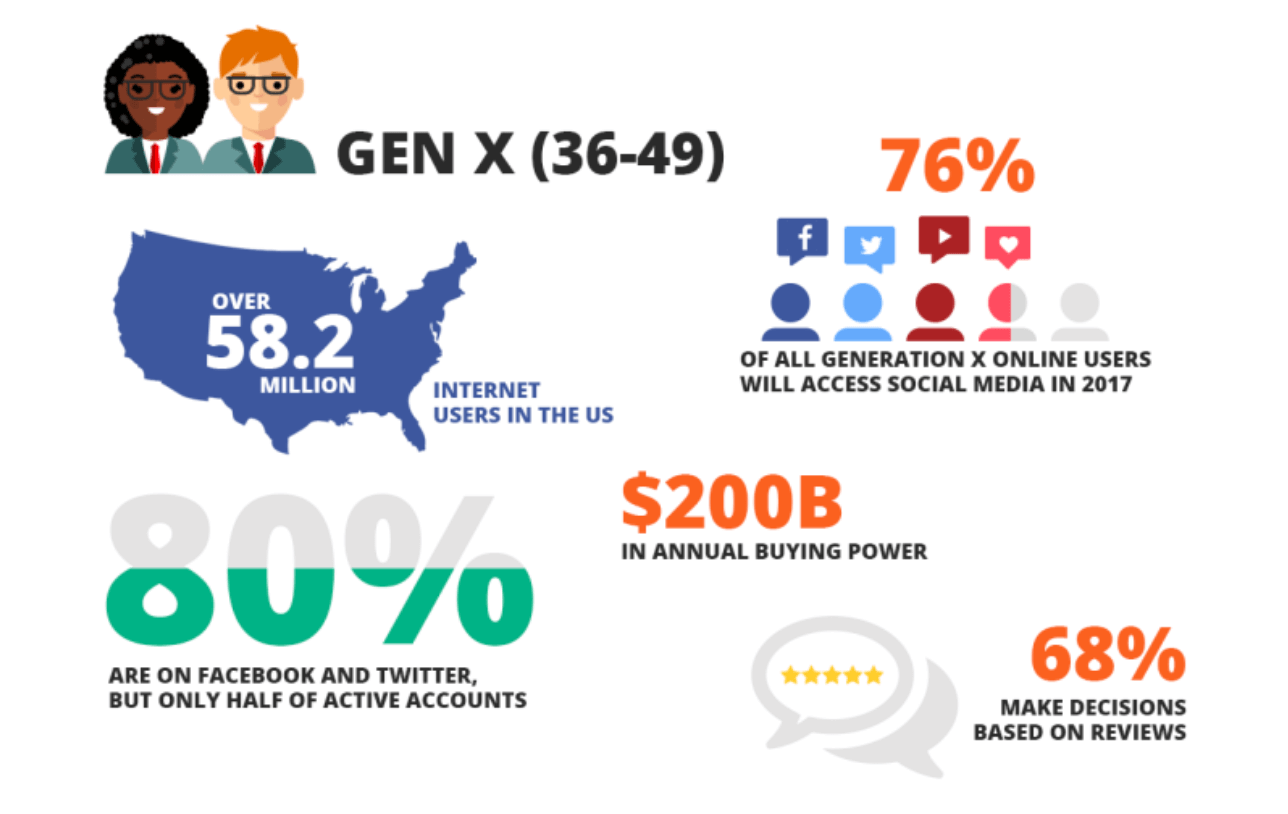
Source: SmallBizTrends
Born after the Baby Boomers, somewhere between the years 1965 and 1980, this is a generation known to be busy, materialistic, and competitive. They are currently between 40-55 years old. Having grown up during the times of the Cold War and many political scandals, they have little confidence in institutions and organisations and don’t trust that they can rely on social security after retirement. The status orientated Generation X values contribution, feedback and autonomy.
Gen X is doing it all at once: Raising a family, paying off student debt and mortgage, and taking care of their aging Baby Boomer parents. It's little surprising that their financial resources are somewhat limited. Yet, they are at the top of their career journeys, which gives them impressive influence over household and company decisions.
Having grown up with the rise of computer technologies, members of Gen X are usually tech-savvy. But Gen X also still reads newspapers, magazines and listens to the radio or watches TV. They spend roughly seven hours a week on Facebook - their favourite social media platform. Email marketing seems to be the best way to market to Generation X, the preferred channel by about 80 percent of Gen Xers. But busy as they are, it’s smart to keep it short and sweet with a clear call-to-action.
Generational values of Generation X:
- Status oriented
- Resourceful
- Self-sufficient
- Freedom
- Responsibility
Similar to the Baby Boomers, Generation X is heavily brand loyal. We recommend you to consider loyalty programs, and memberships to maintain B2C relationships. You may also consider investing in smaller gifts and samples or vouchers for every first purchase to create a long-lasting bond with new customers.
Generation Y - Millennials
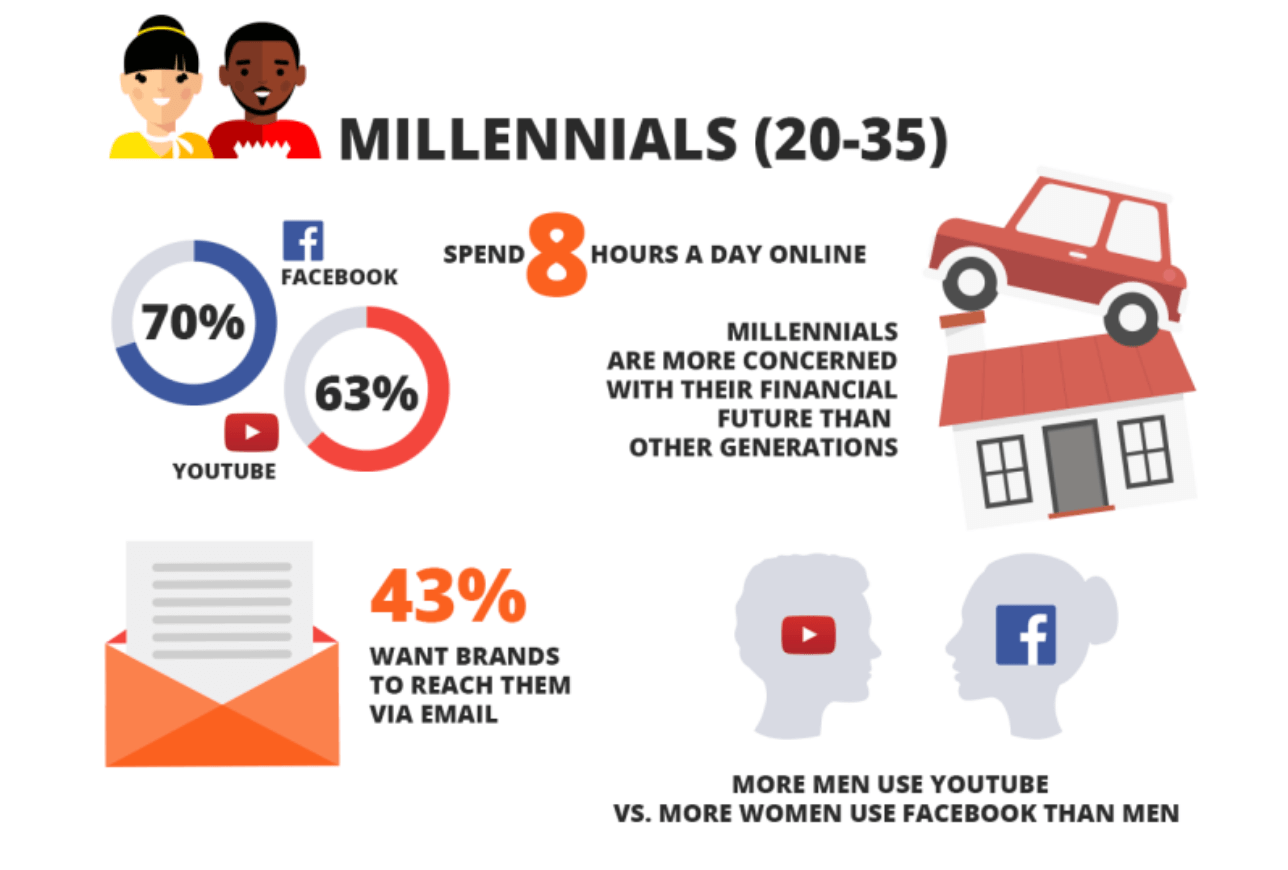
Source: SmallBizTrends
Born between 1980 and 1994 Millenials are frequently stamped as entitled, thanks to their parents’ constant appraisal. Now between 25 and 39 years old, they grew up with the technological explosion of the internet and social media, and the tragic events of 9/11 and their aftermath. Millennials are more idealistic and confrontational than their parents and are known to put social before economic issues. The generation of self-exploration pursuits a lifestyle of enjoyment, while trying to make a difference in the world.

To remain relevant in the minds of Millennials, brands are beginning to highlight their social commitment in their marketing efforts. TOMS is a great example of using these strategies effectively: From the very beginning, the company focused nearly all of its marketing efforts on its social purpose, making it impossible to think about the brand without thinking about its positive social impact too. Many of the later-born Millennials still rely on their parents’ support and those entering a highly competitive workforce are struggling with massive student debts. They are often forced to postpone expensive purchases like weddings or their first home. It is this financial instability that also has them prefer access over ownership. Their preference for on-demand services such as Netflix and Spotify are just examples.
Whilst 95 percent of Millennials still watch TV, Netflix edges out traditional cable as an entertainment source. Heavily relying on all forms of technology, Millennials often show little patience when things aren’t functioning as they would expect it (e.g. delayed page loading speed). As most members of Gen Y have multiple active social media accounts, social media and digital marketing are again pivotal for marketing to this generation. Facebook, Instagram, and Pinterest are the most popular platforms for the discovery and purchase of products amongst the generation. Millennials are used to taking quick actions via ‘purchase now’ functions on platforms where these features are available.
Generational values of Generation Y:
- Confidence
- Tolerance
- Education
- Work-Life-Balance
- Self-Expression
When it comes to Gen Y, it’s about marketing experiences, not products. Well-educated, tech-savvy and socially responsible, but with shorter attention spans than previous generations, Millennials respond best to messaging that is honest, personalised, ethical and humorous. Having less brand loyalty than previous generations and little patience for inefficient or poor service, Millennials place their trust in brands with superior product history such as Apple and Google.
Very similar to Gen Z, they seek recommendations from family and friends, and read online reviews and check ratings before they make a purchase decision. Therefore, we highly recommend keeping this in mind and utilising customer or critic reviews in your marketing efforts.
Generation Z
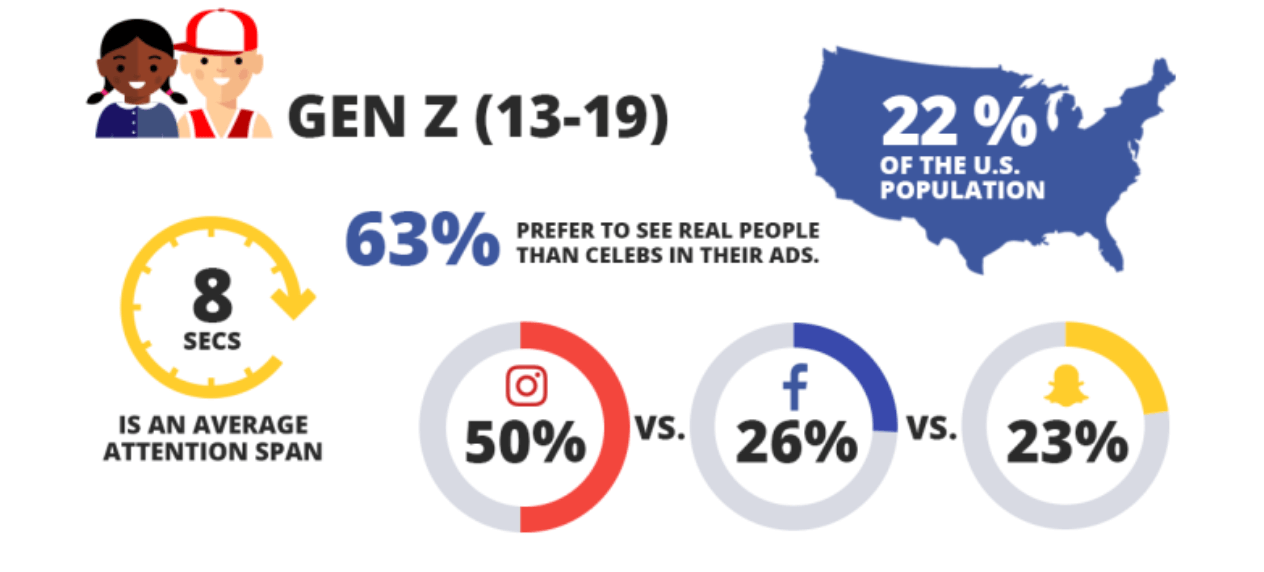
Source: SmallBizTrends
Born between 1995 and 2015, Gen Z is the first generation with easy access to technology for most of their lives. Being 25 years or younger, even the older members of the generation have only recently graduated from college or are still going to school and depending on their parents’ support. Not yet in particularly gainful employment nor seeking such in pursuit of wealth, they are potentially less focused on abundant disposable income and instead extremely ecologically focused. What they do care for are environmental issues, corporate social responsibility, and transparency.
Gen Z also cares about personalisation more than cheap mass-produced products. This generation puts more time and effort into researching companies and products that align with their individual values and needs. They crave a connection with the brands they are buying from. This generation does not trust advertising as much as the previous generations and know very well when it is becoming the target of advertisement. Any form of communication must, therefore, be authentic and above all, your brand must present itself as trustworthy. Give your business a purpose and generate value through meaningful interactions.

The greatest cause of anxiety is separation from their mobile devices. It’s little surprising that you’ll find them checking their social media accounts at least hourly. If you’re marketing to Gen Z, you have eight seconds to convince your audience, because that's exactly how long the average attention span of a teenager is these days. Keep this in mind when creating new marketing material.
Generational values of Generation Z:
- Well-being
- Interconnection
- Social Responsibility
- Diversity
- Stability
Gen Z trusts the words and opinions of others. Genuine reviews and influencer opinions go a long way. We highly recommend you to update your marketing efforts to include testimonials and influencer marketing activities.
Final Thoughts on Generational Targeting
Now that you have a few different marketing strategies for each generation in your pocket, you can get started and send the right message, to the right people using a generational lens. If you’re feeling overwhelmed, our expert team of digital marketers can help you craft a strategy that works for you and your audience.





























